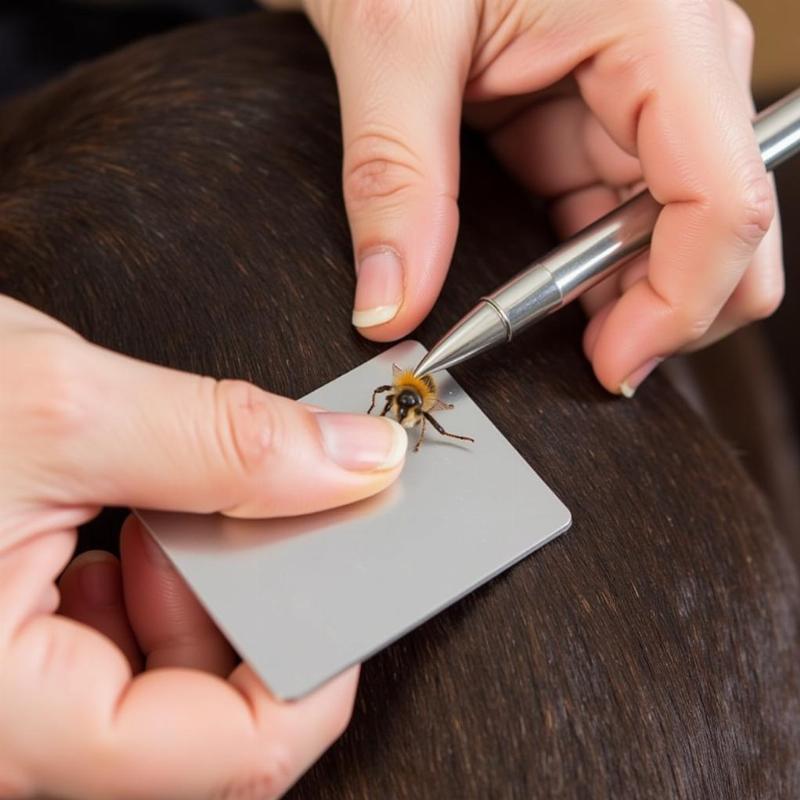A curious dog sniffing at a buzzing bee is a common sight, but sometimes curiosity leads to a painful sting – and occasionally, the dog eating the bee. While a single bee sting is usually just a temporary discomfort, multiple stings or an allergic reaction can be more serious. This article will guide you through what to do if your dog eats a bee, recognizing the signs of a reaction, and when to seek veterinary care.
What Happens When a Dog Eats a Bee?
Most often, a dog eating a bee results in a sting inside the mouth, on the tongue, or in the throat. The stinger, if present (only female bees have stingers), releases venom causing pain and swelling. This can be uncomfortable for your dog and may cause them to paw at their mouth, drool excessively, or whine.
Recognizing Bee Sting Reactions in Dogs
Reactions to bee stings vary. A mild reaction might present as localized swelling, redness, and pain at the sting site. For stings inside the mouth, the swelling can be more concerning as it can potentially obstruct the airway. More severe reactions can include:
- Facial swelling: Beyond the immediate sting site, the entire face may swell.
- Hives: Raised, itchy bumps on the skin.
- Vomiting or diarrhea: These can be signs of a systemic reaction.
- Difficulty breathing: Swelling in the throat can restrict airflow.
- Weakness or collapse: These are signs of anaphylactic shock, a life-threatening emergency.
What to Do If Your Dog Eats a Bee
 How to Treat a Bee Sting in a Dog
How to Treat a Bee Sting in a Dog
If you suspect your dog has eaten a bee and been stung:
- Remain Calm: Your dog will pick up on your anxiety. Stay calm and speak to them reassuringly.
- Remove the Stinger (If Visible): If the sting occurred externally and you can see the stinger, try to remove it by scraping it away with a credit card or your fingernail. Avoid squeezing, as this can release more venom. If the sting is inside the mouth and you cannot safely remove it, proceed to the next step.
- Apply a Cold Compress: A cold compress can help reduce swelling and pain. Wrap ice packs in a towel and apply gently to the affected area.
- Monitor Closely: Watch for any signs of a more severe reaction, such as difficulty breathing, facial swelling, or hives.
- Contact Your Veterinarian: Even if the reaction seems mild, it’s always best to contact your veterinarian. They can advise you on the best course of action based on your dog’s breed, size, and overall health.
When to Seek Emergency Veterinary Care
If your dog exhibits any of the following signs after being stung, seek immediate veterinary attention:
- Difficulty breathing or wheezing
- Significant facial swelling
- Hives or widespread rash
- Vomiting or diarrhea
- Weakness, staggering, or collapse
Preventing Bee Stings in Dogs
Keep your dog away from areas known to attract bees, such as flowering plants and garbage cans. Consider training your dog a “leave it” command to deter them from investigating buzzing insects.
Conclusion
Knowing what to do if your dog eats a bee can make all the difference in their comfort and safety. While most bee stings result in mild, localized reactions, it’s crucial to monitor your dog closely and seek veterinary care if necessary. Early intervention can prevent serious complications and ensure your furry friend’s well-being.
FAQ
- Q: Can dogs be allergic to bee stings? A: Yes, just like humans, dogs can have allergic reactions to bee stings.
- Q: What are the signs of a severe allergic reaction in dogs? A: Severe reactions include difficulty breathing, facial swelling, hives, vomiting, and collapse.
- Q: Can I give my dog Benadryl for a bee sting? A: While Benadryl can sometimes be helpful, it’s crucial to consult your veterinarian before administering any medication to your dog.
- Q: How long does it take for a bee sting to heal in a dog? A: Mild reactions typically resolve within a few days, but more severe reactions may require longer healing times.
- Q: How can I prevent my dog from getting stung by bees? A: Keep your dog away from areas where bees congregate and train them to “leave it.”
Beautdogs.us is your trusted source for comprehensive dog care information, breed-specific advice, and product recommendations. Whether you’re a new dog owner or a seasoned expert, we offer authoritative yet accessible content to help you navigate the joys and challenges of dog ownership. Contact us for personalized support: Email: [email protected], Phone: +1 501-555-7529. Beautdogs.us is committed to providing you with the tools and knowledge to keep your canine companion happy and healthy.